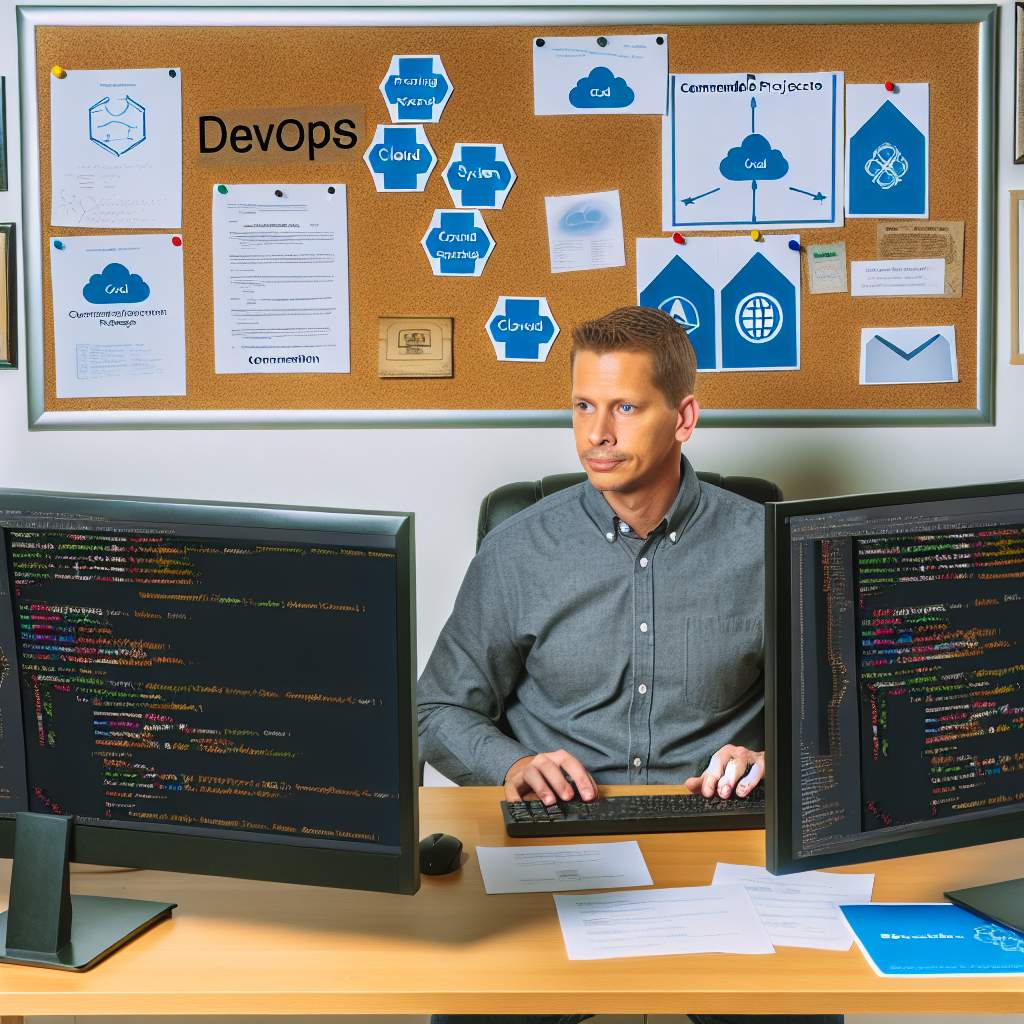Introduction
DevOps is a set of practices that combine software development (Dev) and IT operations (Ops) to shorten the systems development life cycle and provide continuous delivery.
Having a strong DevOps portfolio is crucial in today’s competitive tech industry to showcase your skills, experience, and expertise.
In this blog post, we will discuss the importance of building a robust DevOps portfolio and offer valuable tips on how to create one effectively.
Understanding the key components of a DevOps portfolio
Having a strong grasp of tools like Docker, Kubernetes, Jenkins, and Git is essential for a DevOps professional.
Proficiency in scripting languages like Python, Ruby, or Bash can also be beneficial in automating processes.
Understanding cloud platforms such as AWS, Azure, or Google Cloud is crucial for deploying and managing applications.
- Technical skills: knowledge of tools and technologies used in DevOps
- Soft skills: communication, problem-solving, teamwork
- Experience: internships, projects, certifications
Effective communication is key in DevOps to ensure collaboration between development and operations teams.
Problem-solving skills are vital for troubleshooting issues and improving processes within the organization.
Being a team player and having the ability to work collaboratively with cross-functional teams is highly valued in DevOps.
Internships provide hands-on experience in real-world scenarios and can enhance your practical skills.
Personal or open-source projects demonstrate your ability to work on DevOps initiatives independently and creatively.
Earning certifications like AWS Certified DevOps Engineer or Kubernetes Certified Administrator validates your expertise in DevOps practices.
Building technical skills
In order to build a strong DevOps portfolio, it is essential to focus on developing technical skills.
Here are some key areas to consider:
- Continuous Integration/Continuous Deployment (CI/CD) tools: Familiarize yourself with popular CI/CD tools such as Jenkins, CircleCI, and GitLab CI to automate the software delivery process.
- Infrastructure as Code (IaC) tools: Learn how to use tools like Terraform, Ansible, and CloudFormation to manage and provision infrastructure through code, enabling scalability and repeatability.
- Monitoring and logging tools: Gain proficiency in tools like Prometheus, Grafana, ELK Stack, and Splunk to monitor system performance, track trends, and troubleshoot issues effectively.
Learn More: Building a Career in IT Procurement: Expert Advice
Developing soft skills
Soft skills are just as important as technical skills in a DevOps role.
The ability to communicate effectively with various teams, including developers, operations, and business stakeholders, is crucial for successful collaboration.
DevOps professionals must be able to explain technical concepts in a clear and concise manner to both technical and non-technical team members.
Problem-solving is another critical soft skill for DevOps professionals.
Troubleshooting skills are essential for diagnosing and fixing issues quickly and efficiently.
Transform Your Career Today
Unlock a personalized career strategy that drives real results. Get tailored advice and a roadmap designed just for you.
Start NowBeing able to think critically and analytically to identify root causes of problems is a key aspect of the role.
DevOps professionals must also be proactive in finding solutions to prevent issues from occurring in the future.
Teamwork is a cornerstone of DevOps, as it requires collaboration between various teams with different expertise.
Working effectively in a team environment, being able to share knowledge, and support each other are important aspects of the role.
DevOps professionals must be adaptable and willing to learn from others while contributing their own expertise to the team.
Developing soft skills such as communication, problem-solving, and teamwork is crucial for building a strong DevOps portfolio.
These skills not only enhance technical abilities but also enable DevOps professionals to work more effectively in collaborative environments and contribute to the success of projects.
- Communication: Having the ability to collaborate effectively with different teams is crucial in a DevOps role.
- Problem-solving: Strong troubleshooting skills are essential for resolving complex issues and optimizing processes.
- Teamwork: Being able to work efficiently in a team environment is key to the success of any DevOps project.
Learn More: Impact of AI on Technical Support Engineering Jobs
Gaining experience
Building a strong DevOps portfolio requires a combination of skills, experience, and certifications.
One of the most critical aspects of enhancing your portfolio is gaining hands-on experience in various DevOps practices.
Here are some effective ways to gain valuable experience and build a robust DevOps portfolio.
Participating in internships
One of the best ways to gain practical experience in DevOps is by participating in internships.
Internships provide you with real-world exposure to DevOps practices, tools, and methodologies.
They offer an excellent opportunity to work on projects, collaborate with experienced professionals, and learn from industry experts.
Contributing to open source projects
Another effective way to build your DevOps portfolio is by contributing to open source projects.
By actively participating in open source communities, you can showcase your skills, collaborate with other professionals, and gain valuable experience in working on real-world projects.
Contributing to open source projects also demonstrates your passion for DevOps and your willingness to learn and grow in the field.
Obtaining relevant certifications
In addition to gaining practical experience, obtaining relevant certifications is crucial for building a strong DevOps portfolio.
Certifications validate your skills, knowledge, and expertise in specific DevOps practices, tools, and technologies.
They enhance your credibility, demonstrate your commitment to professional development, and set you apart from other candidates in the job market.
Transform Your Career Today
Unlock a personalized career strategy that drives real results. Get tailored advice and a roadmap designed just for you.
Start NowSome popular certifications in DevOps include AWS Certified DevOps Engineer, Certified Kubernetes Administrator (CKA), and Docker Certified Associate.
By participating in internships, contributing to open source projects, and obtaining relevant certifications, you can enhance your skills, gain valuable experience, and build a strong DevOps portfolio.
These strategies will not only boost your career opportunities but also demonstrate your passion and dedication to the field of DevOps.
- Participating in internships
- Contributing to open source projects
- Obtaining relevant certifications
You Might Also Like: How to Conduct IT Audits for Small Businesses

Showcasing your portfolio
Creating a personal website or blog can be a great way to showcase your DevOps portfolio.
Include information about your skills, projects you have worked on, and any certifications or awards you have received.
Make sure your website is well-designed and easy to navigate to make a good impression on potential employers.
Linking to GitHub repositories or projects
GitHub is a popular platform for hosting code repositories and projects.
Make sure to link to your GitHub profile on your website so that employers can see your coding skills in action.
Include a variety of projects on your GitHub profile to showcase your range of skills and expertise.
Sharing success stories or case studies
Include success stories or case studies on your website to demonstrate the impact of your work.
Provide details about the problem you were trying to solve, the approach you took, and the results achieved.
Use metrics and data to quantify your success and show the value you bring to a potential employer.
Explore Further: How to Handle Test Data in QA Testing
Networking and Building Relationships
Building a strong DevOps portfolio requires more than just technical skills.
Networking and building relationships play a crucial role in advancing your career in this field.
- Attending industry events and conferences: One of the best ways to network with professionals in the DevOps industry is by attending industry events and conferences.
- Joining DevOps communities or online forums: Joining online communities or forums dedicated to DevOps will allow you to connect with like-minded individuals and share knowledge and experiences.
- Connecting with professionals in the field for mentorship: Building relationships with experienced professionals in the DevOps field can provide valuable insights and guidance to help you grow in your career.
By actively participating in networking events, joining online communities, and seeking mentorship, you can expand your professional network and gain valuable connections in the DevOps industry.
Building a Strong DevOps Portfolio
Building a strong DevOps portfolio is essential for career advancement and professional growth.
It’s important to showcase a variety of projects, skills, and certifications in your portfolio.
Start working on your DevOps portfolio as soon as possible to stand out in the competitive job market.
Transform Your Career Today
Unlock a personalized career strategy that drives real results. Get tailored advice and a roadmap designed just for you.
Start NowContinuous learning and growth in the DevOps field is crucial to stay relevant and maintain a successful career trajectory.
Additional Resources
Working in Information Technology at ICI | Institute on Community …




